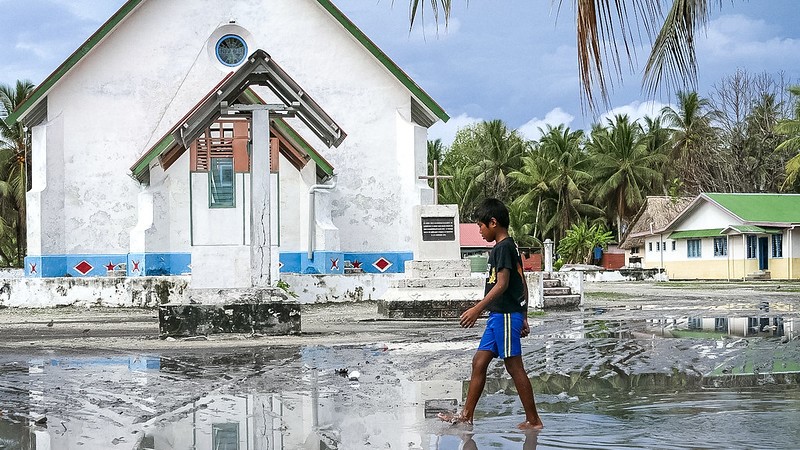Wealthy nations are giving less money to poorer ones for climate projects than their official statistics make out, according to analysis by Oxfam.
In a report published on Tuesday, the anti-poverty charity found that nearly 80% of climate finance to developing countries took the form of loans, rather than grants. Poor nations were expected to pay richer countries back, often for investment in projects with weak climate credentials.
“The excessive use of loans and the provision of non-concessional finance in the name of climate assistance is an overlooked scandal,” the report said.
In 2009, rich countries committed to mobilise $100 billion per year by 2020 to help vulnerable nations cut their emissions and cope with climate impacts.
Oxfam analysed the latest climate finance figures from 2017-2018, when developed countries reported delivering $59.5 billion in climate finance, about 33% more than in 2015-2016.
In total, rich countries gave just $12.5bn in the form of grants, $22bn in loans with better-than-market rates and around $24bn in loans with standard market rates. Interest charges and payments to creditors were not deducted from donor countries’ climate finance figures.
China hits out at US climate record, in pointed message ahead of election
Report co-author Tracy Carty identified Japan and France as having the biggest grant-to-loan imbalance in their climate finance, with just 3% of their overall contributions attached to grants.
Both were among donor countries giving out the highest percentage of market-rate loans, respectively 24% and 16% of their contributions. Market-rate loans made up 55% of Spain’s climate finance and 22% of Germany’s.
In contrast, other donor’s contributions were almost 100% grant-based, including Australia, the EU, the Netherlands, Sweden and Switzerland.
Carty said the coronavirus pandemic meant that more developing countries were unable to take on more debt for climate projects and so, now more than ever, climate finance should take the form of grants over loans.
“Against a backdrop of rising and unsustainable debt in many low income countries, there’s a clear risk that finance that should be helping countries respond to climate change could be harming them in other ways,” said Carty.
Officials from Angola and Belize last week told Climate Home News that their falling revenues and ballooning debt meant they would find it hard to invest in medium and long-term climate adaptation projects.
Last week, over 550 global civil society organisations called on G20 finance ministers to cancel countries’ debts in the wake of the Covid-19 pandemic. Instead, they suspended debt repayments for six months.
Balooning debt cripples poor countries’ hopes of a green recovery
Oxfam have called on all donor countries to agree to record the ‘grant equivalent’ of their climate finance and the terms of any loans in their annual reporting as countries are due to meet for UN climate talks in Glasgow, in November 2021.
The analysis pointed out to another reporting issue with some rich nations’ figures including in their climate finance the full cost of projects which were only partly related to addressing climate change.
For example, the full cost of building a school could be counted as climate finance if part of the funding was to make the school more flood-proof.
In other instances the money was used to support fossil fuel expansion if the project was deemed to cut emissions. Japan claimed it provided $700m in climate finance to Bangladesh but the money was in fact a loan to build the Matabari coal power plant. Tokyo justified the project claiming the plant was cleaner and more efficient than other power plants.
Oxfam warned not enough funds reached the poorest countries and small island developing states to help them cope with intensifying climate impacts, according to countries’ submissions to the OECD and UN Climate Change.
Germany, France, Japan, Canada and Norway gave less than 20% of their climate finance to least developed countries (LDCs) . At the other end of the scale, Denmark directed 41% of its finance to LDCs.
Several nations gave less than 1% of their finance to small island developing states, including Germany, Japan and the UK, while Australia directed half of its funding to them.
Oxfam called on countries to report the percentage of their finance which goes to LDCs and SIDS and cast doubt over whether countries are accurately estimating the amount of private climate finance they claim to have ‘mobilised’.
Some countries did include an estimate of ‘mobilised’ private finance in their figures while Japan claimed to have leveraged $4.5bn in 2017-2018.
At UN climate talks in Poland in 2018, nations agreed guidelines on how to count ‘mobilised’ private finance towards climate finance figures. These principles will be implemented at the Cop26 talks in Glasgow next year, when Oxfam said they should be “strictly applied”.
